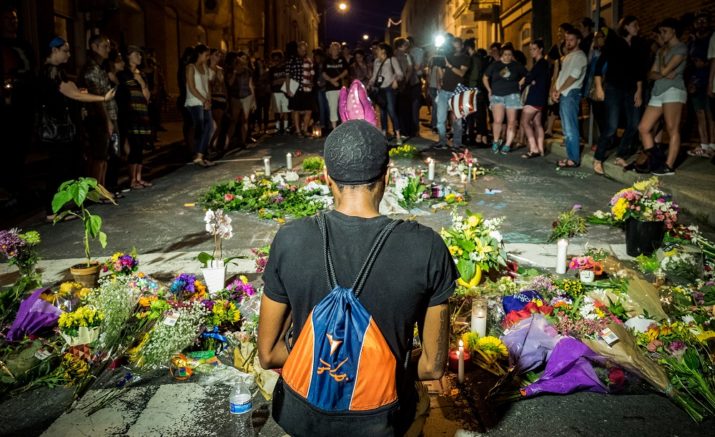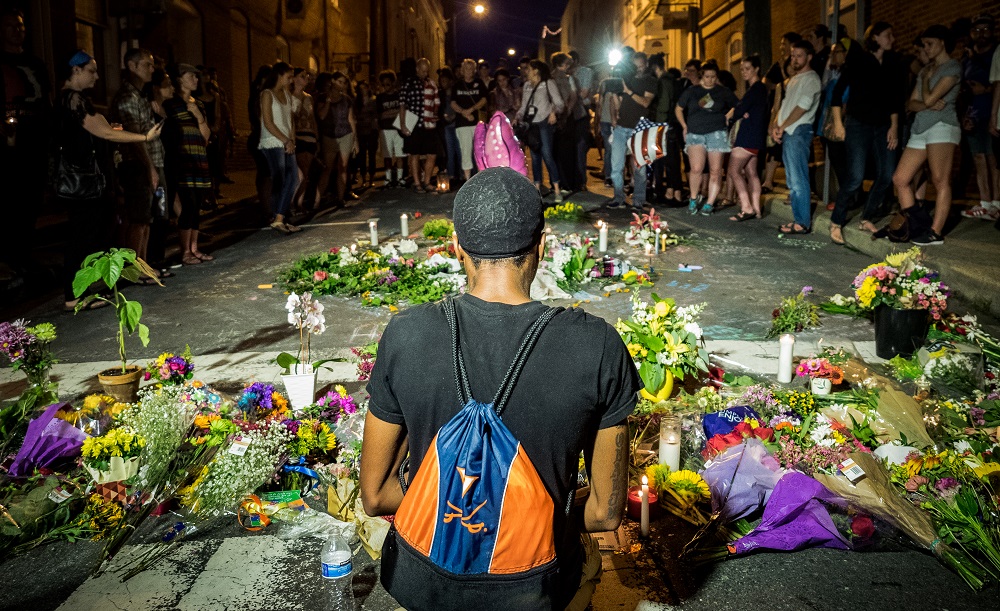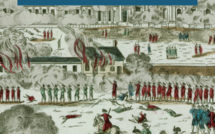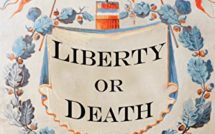
Collective Response: Moving Forward Initiative of the UVa College of Arts and Science

This is part of our Campus Spotlight on the University of Virginia.
After the events of August 11-12, faculty, staff, and students of the UVa College of Arts & Sciences responded quickly and thoughtfully with events and programming that interrogated what happened, the history behind it, the legal and social context, and much more. Performance and art events swiftly organized by students and faculty demonstrated that our community rejects the hatred and violence on display on our campus and the city of Charlottesville. A candlelight vigil on August 16 saw thousands of people gathering peacefully around the Rotunda – the iconic historic building at the heart of the University of Virginia.
To support the positive momentum of the university community’s immediate response to August 11 and 12, the Office of the Dean of the College of the Arts and Sciences set up a special fund to help grow events already planned and to enable more activity in the following months. Priority was given to interdisciplinary programming on topics such as race, inequality, and social justice that enriched ongoing academic activities and connected the university to the broader Charlottesville community. A committee was formed to advise the Dean’s Office on the allocation of funds. Co-chaired by Matthew Burtner (Chair of Music) and Manuela Achilles (Director of the Center for German Studies), this committee included faculty who had been active in organizing events in the immediate aftermath of August 11-12.
Projects funded through the A&S Collective Response initiative brought together large and diverse audiences from across the UVa and Charlotteville community. To give but a few examples of the highly successful projects and events:
The Carter G. Woodson Institute launched a series of four workshops and two performances designed to foster community, introspection, and reconciliation through art making, focusing specifically on questions related to race, place, and history. The series, called August in Perspective: Creative Responses to #Charlottesville, brought together community and university researchers: Katelyn Hale Wood and Kim Brooks Mata (Drama), A.D Carson (Music), Citizen Justice Initiative (Woodson Institute), Mecca Burns (PRESENCE Center for Applied Theater Arts), Paloma McGregor and Rashida Bumbray (Dance Diaspora). The initiative was organized by Deborah McDowell (Carter G. Woodson Center, and Department of English).
The Department of Art and the Department of Music brought Wadada Leo Smith and his Golden Quintet to Charlottesville for a residency, and to perform as part of the Impulse Festival of improvisation arts. The group performed Smith’s America’s National Parks, addressing issues of social justice in public spaces. The residency also featured a Q&A discussion on the August Charlottesville events; a reception at the Jefferson School’s African American Heritage Center where an exhibition of Wadada’s original musical scores is being displayed for 13 weeks, a solo concert by Anthony Davis as part of the Impulse Festival, and contact services with UVA and Albemarle High School. The residency was organized by George Sampson (Department of Art, and Greg Howard (Chapman Stick Artist).
Victory Hall Opera produced the opera, Sympathy, by Jean-Philippe Rameau from 1751, at The Haven downtown, across from Emancipation Park (formerly known as Lee Park). This ambitious collaboration with community arts and social justice organizations, presented in a venue housing a local homeless shelter and community center, featured African American choreographer María Daniel and her troupe of nine youth Hip Hop dancers; Leslie Scott-Jones, a noted local African American director and Black Lives Matter Chapter Organizer; the Early Music Access Project, a new ensemble in Charlottesville that performs in alternative venues for new audiences; two UVA Music Faculty and six UVA students (chorus, dancers, cover roles). The production addressed contemporary social justice issues through dramatic musical performance of an 18th century opera (organized by Brenda Patterson, Department of Music).
The Medieval Studies Program hosted a one-day symposium, entitled “Identity/Politics—Medieval/Modern,” exploring heraldic emblems, old Norse runes, Viking helms, Celtic crosses and other symbols as used by white supremacists marching in Charlottesville as a means of claiming roots in a “pure” medieval past. The project was created by Eric Ramirez-Weaver (Art History) and Bruce Holsinger (Department of English).
The Graduate Student Coalition for Liberation (GSCL) created a Community Action Speaker Series featuring local voices exploring themes related to the #SummerOfHate, such as Civil Rights and Self Defense, and Black Lives Matter, State Violence, and Alternatives to Policing. The project was created by UVa graduate students Lee Bloch (Anthropology), Sarah Winstein-Hibbs (English), Eva Latterner (English), and Johnathan Favini (Anthropology).
Anthropology graduate students organized a roundtable, “From the Streets of #Charlottesville: Activism, Academia, and Anthropology,” as part of the American Anthropological Association (AAA) Annual Conference in Washington, DC. The group then hosted a reception at UVa to present on their panel. The initiative was organized by doctoral candidates Jacqueline Cieslak (Anthropology) and Irtefa Binte-Farid (Anthropology).
The American Sign Language Program created a “Disability, Race, and Ethnicity” Panel as part of the Third Biennial Disability Studies Symposium: “Disability at the Intersection,” Two visiting guests led the panel that directly related to the racial issues raised on Aug. 11-12. The panel was organized by Christopher Krentz (English, and American Sign Language).
The Jewish Studies Program, the Center for German Studies, the German Department, the History Department, the Religious Studies Department in cooperation with the Virginia Center for the Studies of Religion (VCSR), the Institute for the History of Global Cultures (IHGC), and the East Asia Center brought Timothy Snyder (Yale University) to grounds for a public lecture “On Tyranny: Twenty Lessons from the Twentieth Century, “and a workshop in German Studies. Gabriel Finder (Department of German, and Jewish Studies Program) organized the residency.
The Corcoran Department of History organized a Public Conversation Series featuring sessions on “The Struggle for Racial Justice at the University of Virginia” led by Claudrena Harold; “Civil War Memory: Charlottesville and Beyond” led by Gary Gallagher, John Mason, and Elizabeth Varon; “The Fascist Threat: What You Should Know” featuring Manuela Achilles, William Hitchcock, James Loeffler, Kyrill Kunakhovich, and Sarah Milov; and “The Recent History of the Alt-Right,” led by Jamelle Bouie and Dahlia Lithwick of Slate Magazine and Nicole Hemmer of the Washington Post. The whole series was organized by the Working Group on History’s Response to 11-12 August, which included Brian Balogh, Claudrena Harold, Andrew Kahrl, Kyrill Kunakhovich, Erik Linstrum, Justin McBrien, Sarah Milov, and Gillet Rosenblith.
Last, but not least, the Department of Drama brought Nicole Seefeldt-Gurgel’s to perform 900 Gallons, an invitation to look deeply and honestly at legacies of whiteness. The piece combines ritual and poetry, story and song, and an unappetizing amount of milk drinking, 900 Gallons traces the subtle and not-so-subtle ways white supremacy is woven into Nicole Gurgel-Seefeldt’s family history. Moving backwards and forwards in time, 900 Gallons reckons with the spiritual poison of white superiority, and creates space for the truth telling needed to undermine it. This is a three-day residency with classes and a performance. The residency was organized by Kim Brooks-Mata (Department of Drama).

Manuela Achilles is an Assistant Professor of German and History as well as the Director of the interdisciplinary Center for German Studies at the University of Virginia. She has published broadly on the political culture of Weimar democracy and is currently completing her book manuscript, Invisible Fatherland: Constitutional Patriotism and the Desire for Democracy in Weimar Germany. Achilles’s second research interest revolves around green politics and practices, including the German Energy Revolution. Together with Dana Elzey, she is the editor of Environmental Sustainability in Transatlantic Perspective: A Multidisciplinary Approach (Palgrave MacMillan Energy, Climate and the Environment Series 2013).
Matthew Burtner is an Alaskan-born composer, sound artist and eco-acoustician, whose music and research explores embodiment, climate change, polymetrics and noise. First Prize winner of the Musica Nova International competition, an NEA Art Works recipient and an IDEA Award winner, Burtner’s music has also received honors and prizes from Bourges (France), Gaudeamus (Netherlands), Darmstadt (Germany) and The Russolo (Italy) international competitions. His music has been performed in festivals and venues throughout the world, and commissioned by ensembles such as NOISE (USA), Integrales (Germany), Peak FreQuency (USA), MiN (Norway), Musikene (Spain), Spiza (Greece), CrossSound (Alaska), and others. He is Professor of Composition and Computer Technologies (CCT) at the University of Virginia, Chair of the UVA McIntire Department of Music, and Director of the environmental arts non-profit organization, EcoSono.
Photo: Vigil for Heather Heyer, murdered by a neo-Nazi on Saturday afternoon, Christian W. McMillen | Flickr
Published on February 1, 2018.




